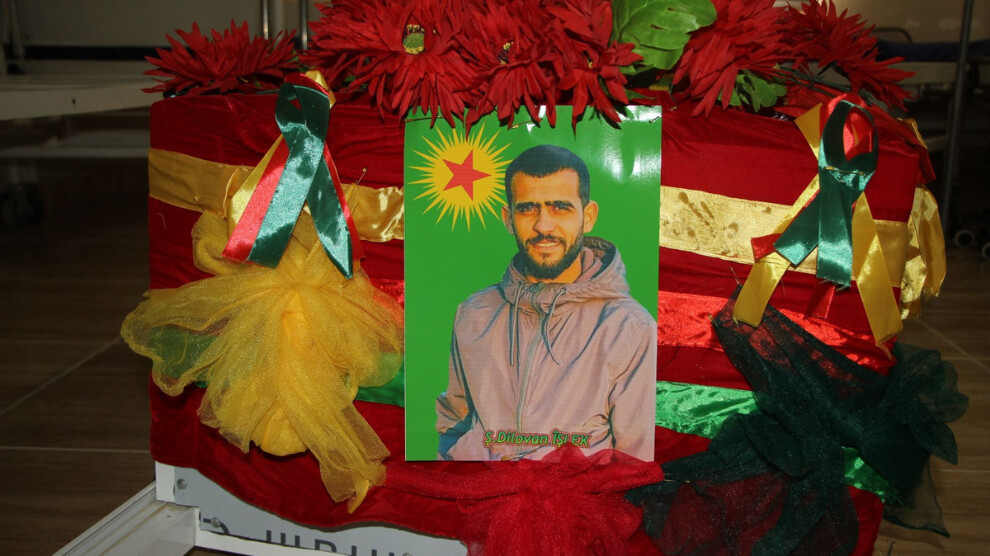Maxmur resident killed in Turkish drone attack laid to rest
Dilovan Işlek, who was killed by a Turkish drone yesterday, has been laid to rest in the self-administered Maxmur refugee camp in southern Kurdistan (northern Iraq).
Dilovan Işlek, who was killed by a Turkish drone yesterday, has been laid to rest in the self-administered Maxmur refugee camp in southern Kurdistan (northern Iraq).

Dilovan Işlek, a resident of the Maxmur refugee camp in the Kurdistan Region of Iraq, was killed in a Turkish attack on Tuesday, October 17. The car İşlek was driving was bombed by a drone near Koye. While he lost his life at the scene, three women who were also in the car were injured.
Thousands of people attended the funeral in Maxmur today.
The body of Dilovan Işlek was brought to the self-administered refugee camp southwest of Hewlêr (Erbil) last night. In the morning, the population of the camp gathered at the building of the Association of Martyrs’ Families and held a minute of silence in memory of the martyrs of the Kurdish liberation struggle.
Filiz Budak, co-chair of the Maxmur People's Council, condemned Turkey's attacks and said: "The Turkish state attacks Kurds who stand up for a dignified life. It fears them and mobilizes dozens of planes for a single Kurd. Dilovan is a martyr who was born on the run. He grew up loving his country and his attitude and personality were much more mature than could have been expected at his age. Our youth show an attitude that we can hardly do justice to with words. The people of the Maxmur Camp, with their indomitable attitude and their very existence, are a nightmare for the enemy. Every moment we breathe is a problem for the enemies of the Kurds. For this reason, our fascist enemy has carried out three air raids on the people of Maxmur within ten days. Yesterday, Dilovan's car was attacked at a great distance from the camp. Comrade Dilovan's attitude will always be an example for us. With this attitude, we will defeat the enemy."
Family members of Dilovan İşlek also gave speeches at the funeral service. Mehmut Işlek stated that the Kurdish people condemn treason and said: "Dilovan is not our first martyr. I offer my condolences to Leader Apo [Abdullah Öcalan] and the Kurdish people. We cannot win until we defeat treason. Therefore, we must unite against betrayal. I kiss the eyes of all the children of Maxmur. They are all our children."
The mother of Dilovan, Helim Işlek, expressed similar sentiments: "Dilovan was not only my child, he was also your child. I express my condolences to Leader Apo, the freedom guerrillas, the resisting prisoners and the Kurdish people. To our martyrs, I give my word that we will not give up their struggle."
After the funeral service, the body of Dilovan Işlek was buried in Maxmur Cemetery with the slogans "Down with treason" and "Martyrs are immortal".
About twelve thousand people live in the Maxmur Camp, which is located southwest of Hewlêr (Erbil) in an area disputed between the autonomous government of the Kurdistan Region of Iraq (KRI) and the Iraqi central government in Baghdad. A large part of the population was displaced by the Turkish state in the 1990s in the course of the anti-Kurdish "counterinsurgency" and the so-called scorched earth policy. Under the pretext of fighting the PKK, about 3,000 villages were depopulated or burnt down at that time. After an odyssey of several years and stays in various camps, the people established the Maxmur Camp on the edge of the desert in 1998.
The Maxmur refugee camp, which is organised on a grassroots democratic basis and is self-managed, is a thorn in Turkey's side. Ankara criminalises the camp as a "breeding ground" of the PKK (Kurdish Workers' Party) that needs to be "cleaned up" and repeatedly attacks it from the air. On 7 October, a mosque in the camp was bombed by a drone, injuring a woman and her two sons. On 13 October, a fifty-year-old woman was wounded in an airstrike on her home in the camp. In August last year, a father of six was killed by a drone. In an airstrike three months earlier, a civilian was also fatally wounded by the Turkish army. These war crimes have remained without consequences until today.
Officially, Maxmur and its inhabitants are under the protection and control of the United Nations Refugee Agency (UNHCR). In practice, however, the organisation is only nominally present. It left the camp during the ISIS attacks in 2014 and did not return afterwards. The camp's population therefore accuses the UNHCR of neglecting its duties towards Maxmur. Since 2019, the camp has been subject to an embargo by the KRI government, which is dominated by the Barzanî party, KDP, which is loyal to Ankara. In spring, the residents of Maxmur resisted for a fortnight against a militarisation of their camp by the Iraqi military, which had been pushed by Ankara and Hewlêr.